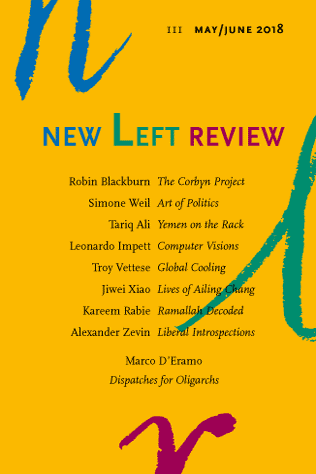Given the imbalances of the UK economy—overblown financial sector, gaping current account, delirious levels of debt—what structural changes might a Corbyn government effect? Robin Blackburn discusses prospects and proposals for an egalitarian shift.
Cool post-mortem on the 1936 Popular Front government in France, written while it was still technically alive. Centrality of consciousness and importance of timing, in politics as in music—and Machiavelli as a better guide than Marx.
From Arafat’s pharaonic tomb and Dubai-style luxury apartments to sweltering refugee camps and landless, beleaguered villages: greater Ramallah as synecdoche for post-Oslo Palestine—and triumph for Israel’s fragmentation strategy.
Are there hints of a solution to climate change in the Little Ice Age? Offering a critique of ‘steady-state’ ecological economics, green nuclear and artificial geo-engineering, Troy Vettese proposes the thought-experiment of a ‘half-earth’ alternative: agricultural land left to nature, egalitarian eco-austerity, green services and veganism.
One of China’s greatest modern writers, Eileen Chang reframed its traditional fictional forms to grapple with post-1919 realities: decline of the Qing aristocracy, price of female emancipation, devastation of the Sino-Japanese war. Jiwei Xiao asks how publication of her long-suppressed last novel alters understandings of Chang’s work.
The historical arc of print journalism, from its emergence as the instrument of a rising bourgeoisie through a twentieth-century heyday, buoyed by consumer advertising—and coming retreat to a subscription-only luxury market under the new oligarchy.
Tariq Ali on Helen Lackner, Yemen in Crisis. A social anthropologist on the background to the 2011 uprising and devastating US–Saudi war.
Alexander Zevin on Edward Luce, The Retreat of Western Liberalism. Indictment—and illustration—of liberal complacencies.
Leonardo Impett on Max Tegmark, Life 3.0. Symptomatic preview of a machine-run world from a mathematical cosmologist.
